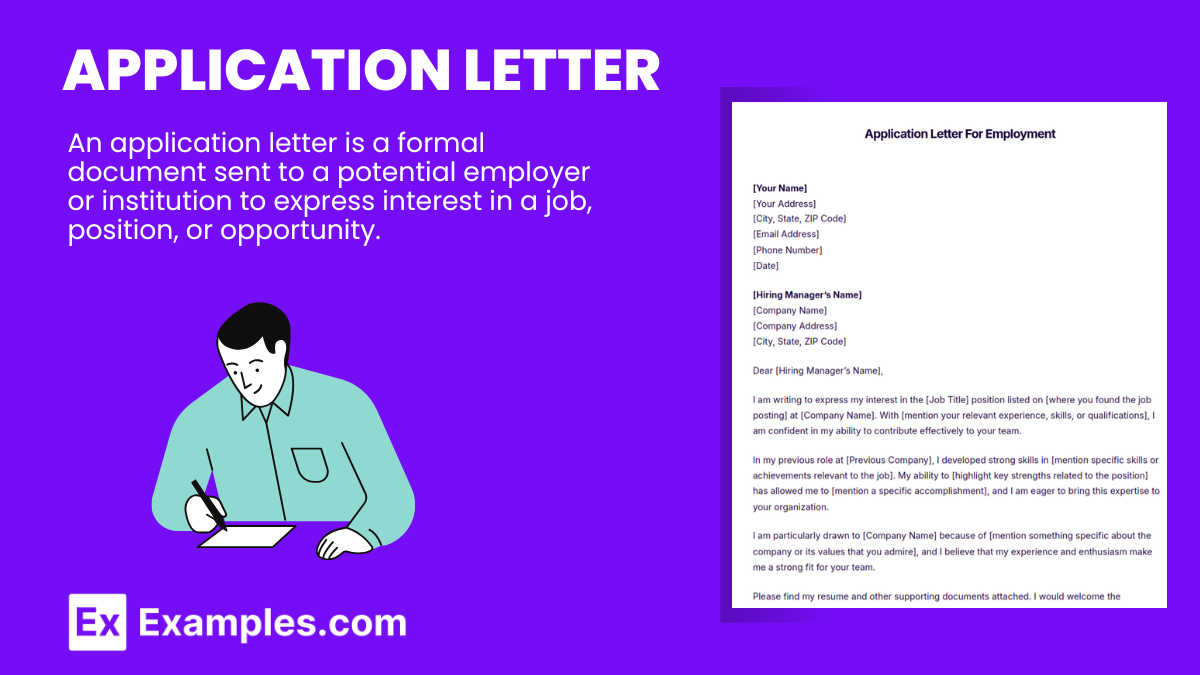17+ Application Letter Examples to Download
Many applicants rarely take time in making application letters, application emails, or professional cover letters assuming that a job resume would do or hiring personnel just won’t take time in reading them. While this may be true in some cases, it is always better to be safe than sorry. If you are curious about writing your application letter, this article would help you achieve an articulate composition to let you have that dream job of yours.
What is Application Letter?
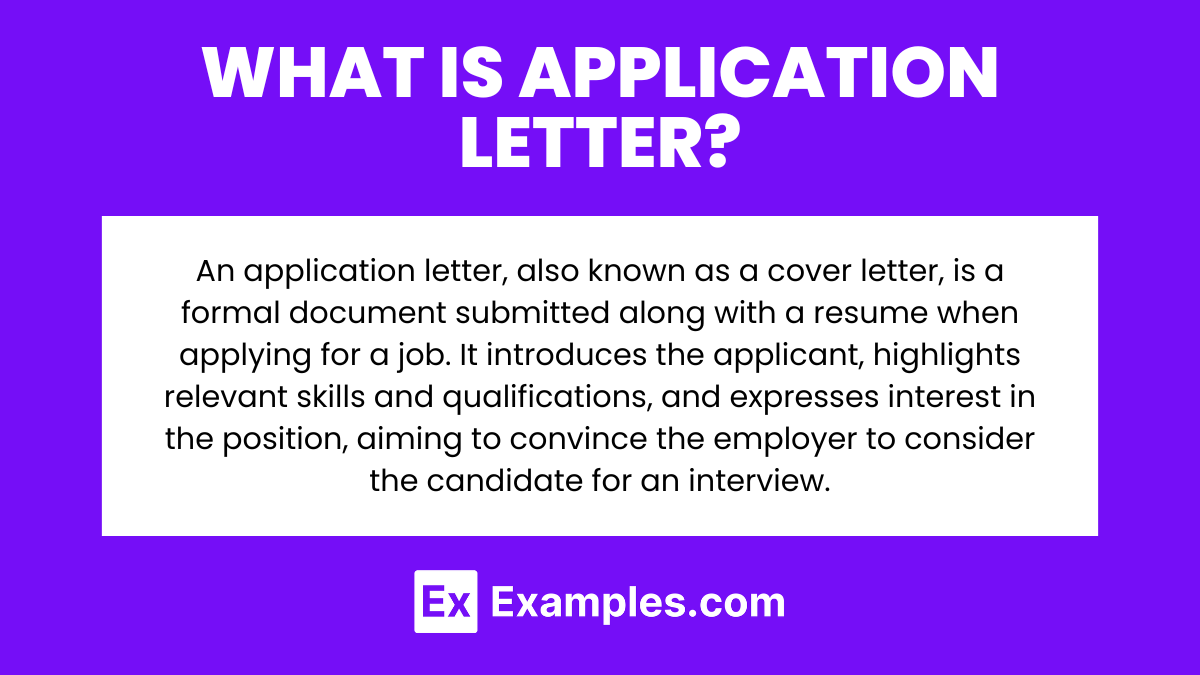
Application Letter Bundle
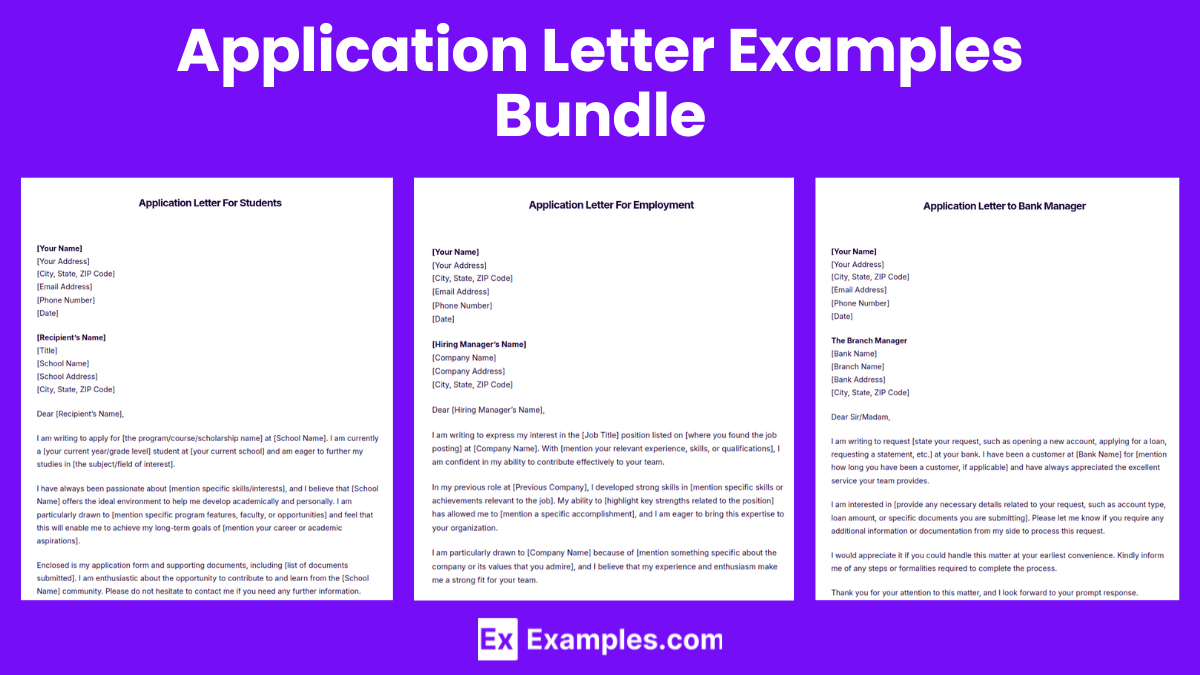
Download Application Letter Bundle
Application Letter Format
Opening Remarks
Greeting: Begin with a formal and respectful greeting.
Example: “Dear Hiring Manager,”
Introduction
Purpose: Briefly state the purpose of your letter.
Example: “I am writing to express my interest in the [Job Title] position at [Company Name], as advertised on [Job Posting Source].”
Body
Highlight Skills and Experience: Mention your key qualifications, skills, and experience relevant to the job.
Example: “With over five years of experience in [relevant field], I have developed strong [specific skills], which align with the requirements of the role.”
Explain Why You’re a Fit: Clarify why you’re suited for the position and how you can contribute to the company.
Example: “I believe my background in [specific area] and my ability to [relevant task] will enable me to make a valuable contribution to your team.”
Mention the Company: Show you have researched the company and express enthusiasm.
Example: “I admire [Company Name] for its commitment to [specific value or mission], and I am excited about the opportunity to be a part of such an innovative organization.”
Closing Remarks
Summarize: Recap your interest in the role and enthusiasm to contribute.
Example: “In conclusion, I am excited about the opportunity to contribute to [Company Name] and look forward to the possibility of discussing how my skills can support your team.”
Request for an Interview: Politely ask for the next step, typically an interview.
Example: “I would greatly appreciate the opportunity to interview for this position and discuss how my qualifications align with your needs.”
Farewell
Goodbye: End with a polite farewell and sign off.
Example: “Thank you for your time and consideration. Sincerely, [Your Name]”
Application Letter Example
Dear Hiring Manager,
I am writing to express my interest in the [Job Title] position at [Company Name], as advertised on [Job Posting Source]. I believe my qualifications and experience make me a strong candidate for this role.
First and foremost, my background in [Relevant Field] has provided me with the skills necessary to excel in this position. I have successfully [mention key achievements or experiences related to the job].
I would also like to highlight my ability to work effectively as part of a team, as demonstrated during my time at [Previous Company], where I collaborated with colleagues to [mention relevant teamwork experience].
Additionally, I admire [Company Name] for its commitment to [mention a specific value or mission of the company], and I am excited about the opportunity to contribute to your ongoing success.
In conclusion, I am confident that my skills and experience will allow me to make a valuable contribution to [Company Name]. I look forward to the possibility of discussing my application further and am available for an interview at your convenience.
Thank you for your time and consideration.
Sincerely,
[Your Name]
Short Application Letter Example
Dear Hiring Manager,
I am writing to express my interest in the [Job Title] position at [Company Name]. I believe my experience in [Relevant Field] makes me a strong candidate for this role.
First, my background in [Key Skills] has equipped me to succeed in this position. My time at [Previous Company] allowed me to further develop these skills.
I am excited about the opportunity to work with [Company Name] and contribute to your ongoing success.
Thank you for your time and consideration. I look forward to discussing my application further.
Sincerely,
[Your Name]
Application Letter For Students
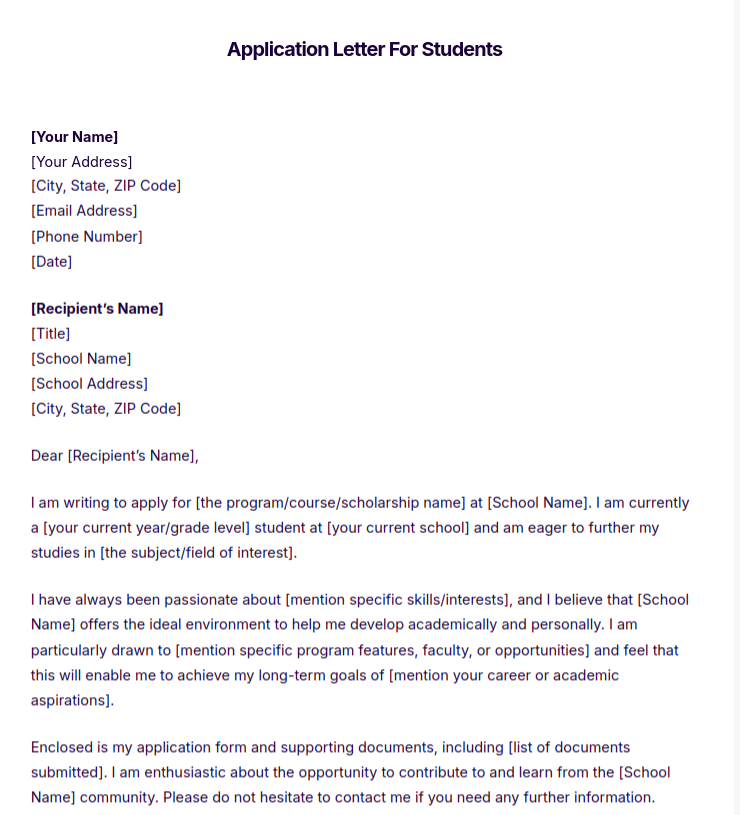
Application Letter For Employment
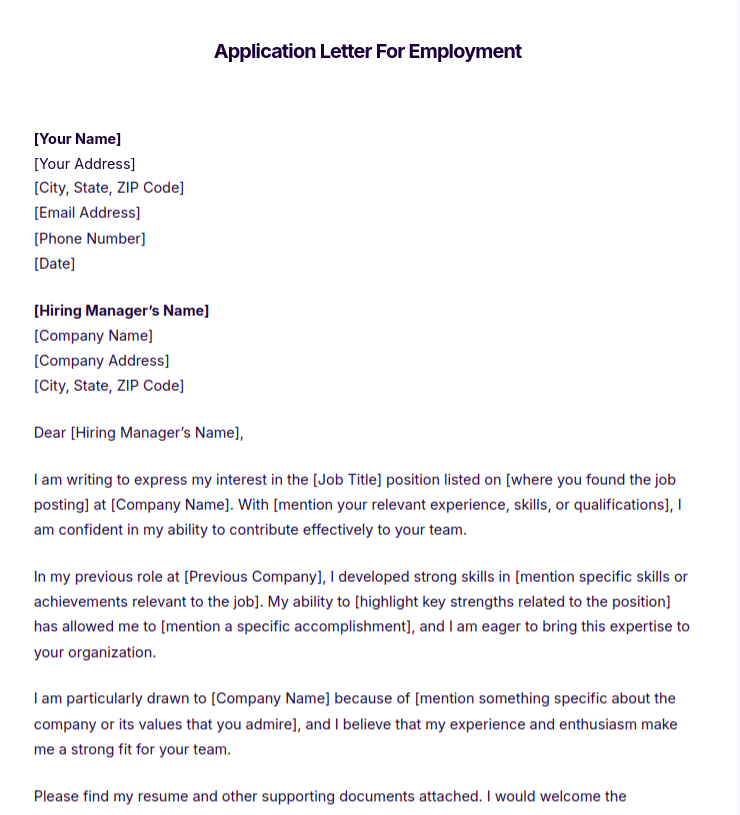
Application Letter to Bank Manager
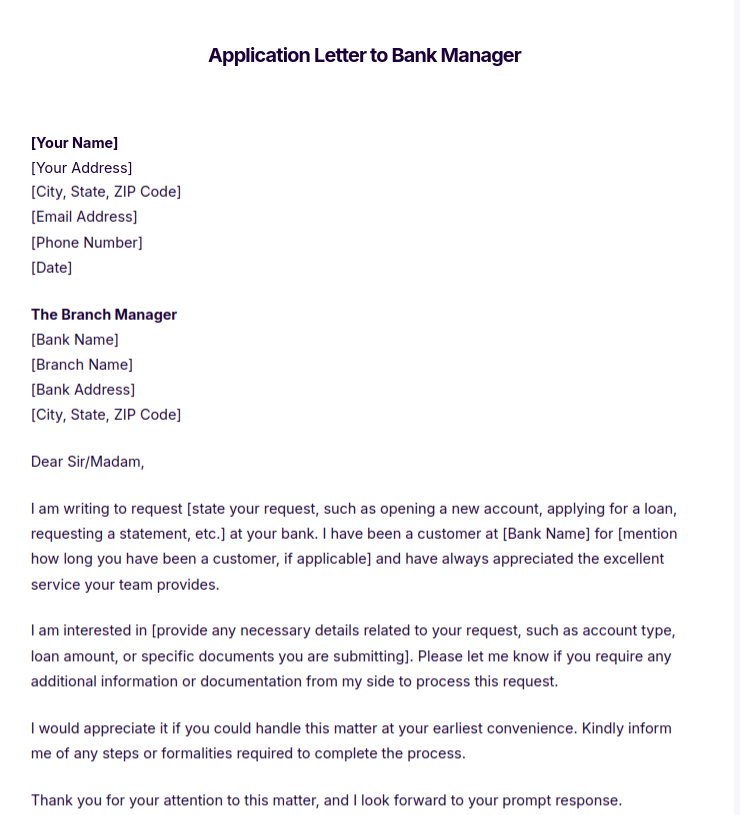
More Application Letter Examples and Samples
1. Free Simple Application Letter Template
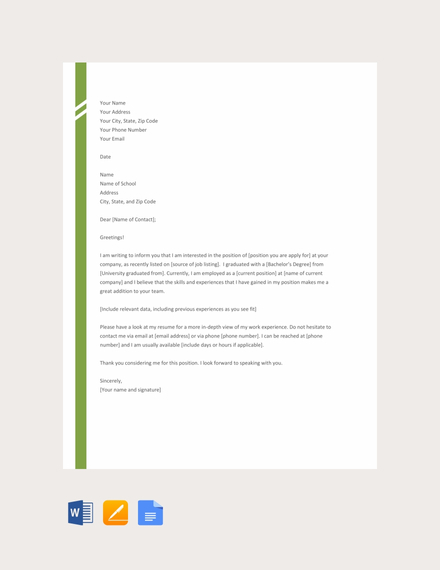
2. Business Loan Application Letter Template
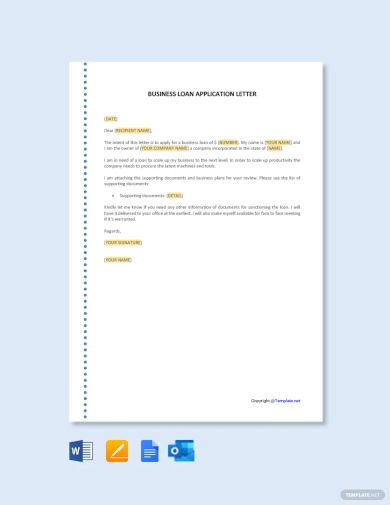
3. Scholarship Application Letter Template
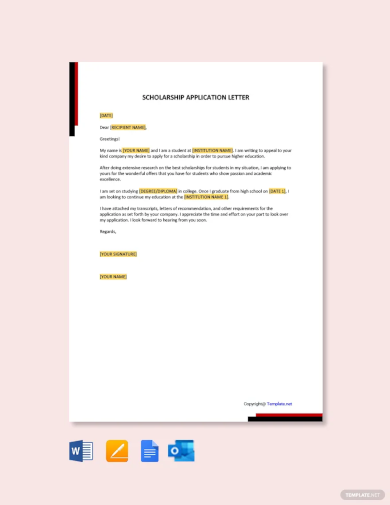
4. College Application Letter Template
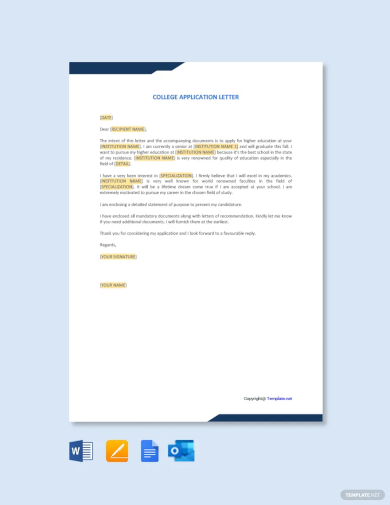
5. Membership Application Letter Template
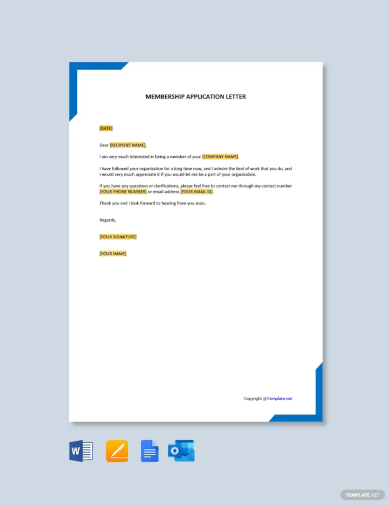
6. Teaching Post Application Letter
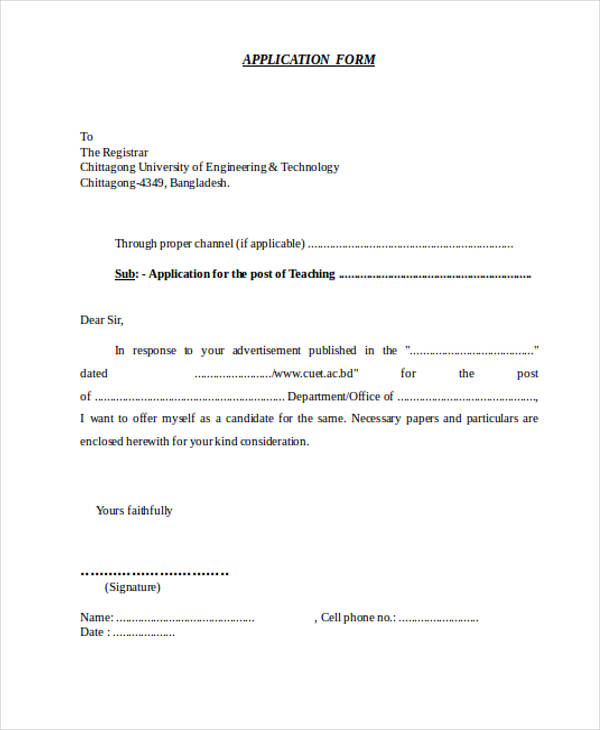
7. Volunteer Job Application Letter
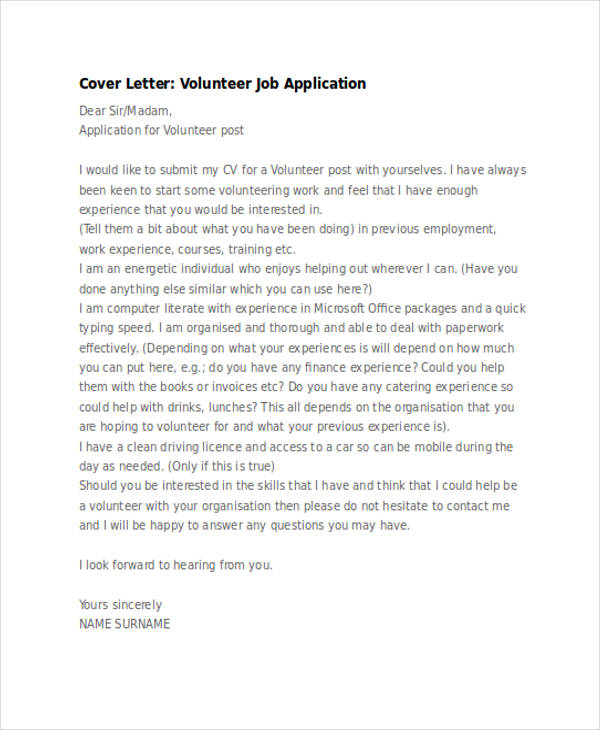
8. High School Application Letter
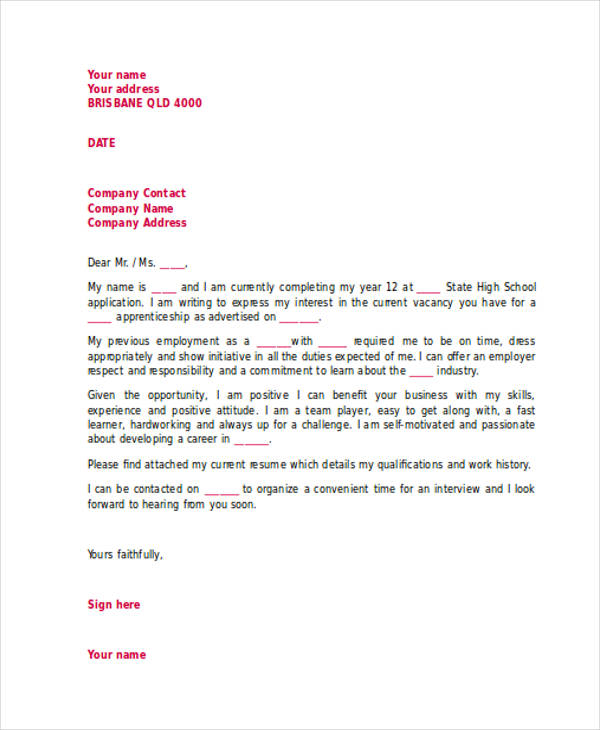
9. Formal Employment Application Rejection Letter
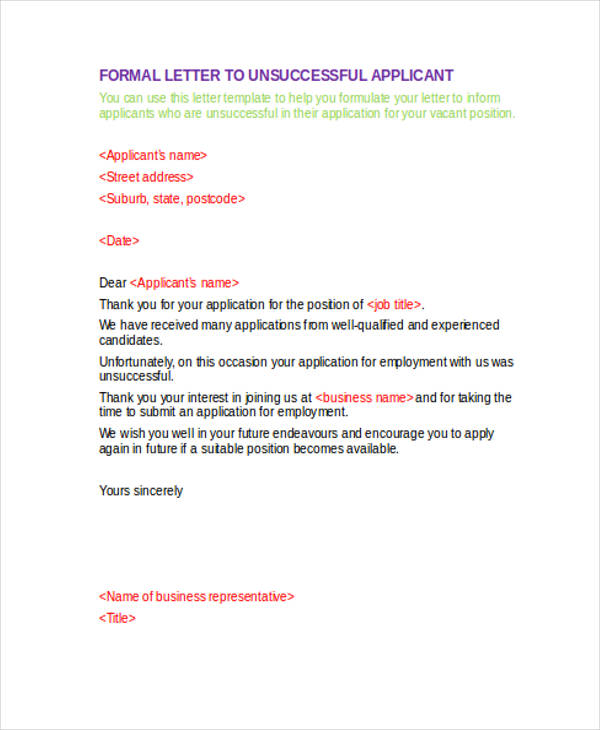
How to Write Application Letter?
Writing an application letter involves a formal structure and a clear, concise expression of your purpose. Here’s how to write an effective application letter:
Header (Sender’s Details)
Your name
Your address
Your phone number
Your email address
DateEmployer’s Details
Name of the hiring manager or recipient
Their title (if known)
Company’s name
Company’s addressSalutation
Use a formal greeting like “Dear Mr./Ms. [Last Name],” or “Dear Hiring Manager,” if the name is unknown.
Introduction
State the purpose of your letter (e.g., applying for a specific job or seeking a position in the company).
Mention where you found the job posting or who referred you.
Include a brief statement on why you are interested in the position or the company.Body
First Paragraph: Highlight your relevant skills, qualifications, and experience. Provide examples of how your experience matches the job requirements.
Second Paragraph: Explain why you are the best candidate. Mention your strengths, accomplishments, and how you can contribute to the company.
Third Paragraph: Express enthusiasm for the role and willingness to discuss your application in more detail.Closing
Politely thank the reader for considering your application.
Mention that you have attached your resume or any other required documents.
Indicate your willingness for an interview.
Close with a formal sign-off like “Sincerely” or “Best regards,” followed by your name.
Importance of Application Letter
An application letter is an essential document for several reasons, especially when seeking employment or admission to a program. Here are the key points explaining the importance of an application letter:
1. First Impression
- The application letter is often the first document a potential employer or institution sees. It introduces you, your qualifications, and your interest in the position or program, setting the tone for the rest of your application.
- A well-written letter can leave a positive, lasting impression.
2. Highlights Relevant Skills and Experience
- It gives you the opportunity to showcase your skills, experience, and qualifications tailored to the specific role or program you are applying for.
- Unlike a resume, an application letter allows you to explain how your background makes you a good fit for the role, helping you stand out.
3. Personalizes Your Application
- A resume can be impersonal, listing facts about your experience. An application letter personalizes the application, allowing you to explain your motivation, enthusiasm, and passion for the job or program.
- It also shows that you’ve done your research about the company or institution, making your application more targeted.
4. Provides Additional Context
- It allows you to address gaps in your resume, changes in your career, or other unique circumstances that may require further explanation.
- You can use the letter to highlight your most significant achievements and make a strong case for why you should be selected.
5. Demonstrates Communication Skills
- Writing a clear, professional, and well-organized letter demonstrates your ability to communicate effectively, which is often a key skill in many jobs.
- Employers or admissions officers assess your attention to detail, writing style, and professionalism based on your application letter.
6. Expresses Enthusiasm and Commitment
- It provides a platform to express your genuine interest in the position or program, showing that you’re not just sending a generic application.
- Employers and institutions value candidates who are enthusiastic and committed, and an application letter is an effective way to convey this.
7. Increases Your Chances of Being Selected
- A well-crafted application letter can differentiate you from other candidates and increase your chances of being shortlisted for an interview.
- It shows that you’re serious about the opportunity and are willing to take the extra step to explain why you’re the right fit.
Tips for Application Letter
Here are some tips for writing an effective application letter:
- Start with a strong introduction: Clearly state the purpose of your letter and the position you are applying for.
- Tailor the content: Customize the letter for the specific job or program, showing you understand the role and requirements.
- Highlight your strengths: Focus on key qualifications and skills that align with the job description.
- Be concise: Keep your letter to one page, focusing on the most relevant details.
- Show enthusiasm: Convey genuine interest in the role and the organization.
- Proofread: Ensure your letter is free of grammar and spelling errors.
- Include a call to action: Politely express your desire for an interview or further discussion.
FAQS
How do I address the recipient if I don’t know their name?
Use a general salutation like “Dear Hiring Manager” or “To Whom It May Concern.” However, try to research and find the recipient’s name if possible.
Should I mention salary expectations in an application letter?
Only include salary expectations if the job posting specifically requests it. Otherwise, avoid this topic in your letter.
How do I address employment gaps in an application letter?
Briefly explain any gaps in employment, focusing on how you’ve stayed productive or developed new skills during that time.
Should I include references in my application letter?
No, references should be provided upon request or listed separately on your resume. The application letter should focus on your qualifications and interest in the position.
What tone should I use in my application letter?
Maintain a formal, professional, and confident tone throughout the letter.


